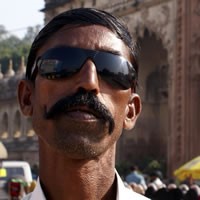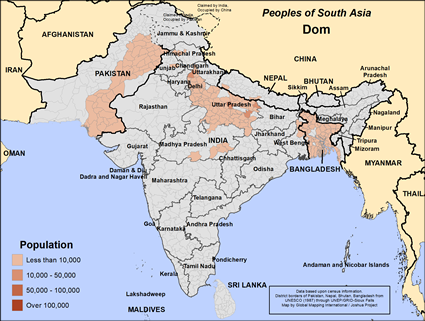Dom (Muslim traditions) in Nepal

Photo Source:
Copyrighted © 2026
Isudas All rights reserved. Used with permission |

Map Source:
People Group data: Omid. Map geography: UNESCO / GMI. Map Design: Joshua Project.
|
| People Name: | Dom (Muslim traditions) |
| Country: | Nepal |
| 10/40 Window: | Yes |
| Population: | 1,700 |
| World Population: | 197,600 |
| Primary Language: | Bhojpuri |
| Primary Religion: | Islam |
| Christian Adherents: | 0.00 % |
| Evangelicals: | 0.00 % |
| Scripture: | Complete Bible |
| Ministry Resources: | Yes |
| Jesus Film: | Yes |
| Audio Recordings: | Yes |
| People Cluster: | South Asia Muslim - other |
| Affinity Bloc: | South Asian Peoples |
| Progress Level: |
|
Introduction / History
The Doms (also known as the Doom, Dum or Dumar) have many different stories of their origin but most center around their becoming an outcast group because of a celebrated slaughtering of a sacred cow. The Dom is a Scheduled Caste in India and is counted among the depressed castes community in Nepal. They can be found in over 500 of the districts of India and Nepal. Others live in Bangladesh.
What Are Their Lives Like?
The Doms are a colorful South Asian community. There are so many different clans and sub-groupings that it is hard to generalize about their lives. They have been traditionally defined by the low occupations of alms collecting, grave digging, cremating, drumbeating, singing, dancing, as well as the making of bamboo baskets (sirki) and mats (chatai). Of the Doms in Nepal about 25% are Muslim. In their Muslim communities some have today entered other labor jobs such as plantation workers and construction workers. In Nepal they primarily speak Nepali and are non-vegetarian.
What Are Their Beliefs?
These people are Sunni Muslims who believe that the supreme God, Allah, spoke through his prophet, Mohammed, and taught mankind how to live a righteous life through the Koran and the Hadith. To live a righteous life, you must utter the Shahada (a statement of faith), pray five times a day facing Mecca, fast from sunup to sundown during the month of Ramadan, give alms to the poor, and make a pilgrimage to Mecca if you have the means. Muslims are prohibited from drinking alcohol, eating pork, gambling, stealing, slandering, and making idols. They gather for corporate prayer on Friday afternoons at a mosque, their place of worship.
The two main holidays for Sunni Muslims are Eid al Fitr, the breaking of the monthly fast and Eid al Adha, the celebration of Abraham's willingness to sacrifice his son to Allah.
Sunni religious practices are staid and simple. They believe that Allah has pre-determined our fates; they minimize free will.
In most of the Muslim world, people depend on the spirit world for their daily needs since they regard Allah as too distant. Allah may determine their eternal salvation, but the spirits determine how well we live in our daily lives. For that reason, they must appease the spirits. They often use charms and amulets to help them with spiritual forces.
What Are Their Needs?
The ministry of Jesus among the poor and outcast is a clear call to reach out to the Muslim Dom of Nepal. There are no known workers among the Muslim Dom in that country. The Dom of India can benefit from the education programs but in Nepal tuition programs and community education can lift some of the children up socially and into traditional schools for the first time.
Prayer Points
Pray for the Muslim Dom culture to be renewed and enhanced by a work of the Holy Spirit and shaped into a God-centered and God-honoring mold.
Pray for the Holy Spirit to move among their family and community leaders to seek his face and enjoy his blessings.
Pray for the Lord to thrust out workers to Nepal who will be compelled to nurture a Disciple Making Movement among the Dom people.
Pray that soon the Muslim Dom people will have faith that will lead them to live honorable lives that will draw others to the savior.